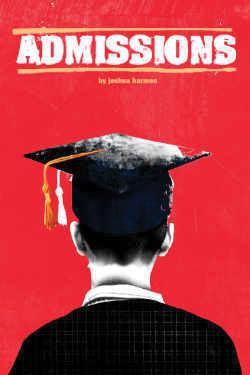Theater Wit explores themes of white guilt, university diversity with ‘Admissions’

Joshua Harmon’s “Admissions” explores themes of white privilege and college diversity quotas. The show will run at Theater Wit in Chicago March 21 through May 12.
March 7, 2019
College admissions quotas, white fragility spinning into white toxicity, administrators of private institutions grappling with how to increase student diversity — no, this isn’t referring to Northwestern, although director Jeremy Wechsler (Communication ’90) noted it very well could be.
In actuality, these themes show up in Theater Wit’s production of “Admissions,” a dark comedy by playwright Joshua Harmon. The show will run at Theater Wit in Chicago March 21 through May 12.
Wechsler said the satirical play follows a white, liberal, upper-middle class couple, Sherri Rosen-Mason and Bill Mason, over the course of their son Charlie’s senior year of high school. Sherri, who serves as the admissions director of a second-tier boarding school, is actively committed to increasing the school’s diversity.
But when Charlie is rejected from Yale — and his best friend, whose father is black, is accepted — the family spirals into chaos, forced to confront tensions about the ways in which white progressives perceive and utilize their privilege.
“In ‘Admissions,’ every character is trying to do the right thing, say the right thing, act ethically and responsibly — and then things spin awry,” Weschler said. “It really asks a lot of interesting and complicated questions about how one should deploy privilege … If you have that power, is it your responsibility to give it up?”
These notions also translate in the rehearsal space. Wechsler acknowledged that this show discusses discrimination under the direction of a white male, meaning that he must ask himself the same questions with which Charlie and Sherri wrestle.
Kyle Curry, who plays Charlie in the production, noted that although his character struggles with institutional ideas of diversity and how he can make an impact, he never arrives at a clear-cut solution.
Curry said the fact that the show doesn’t explicitly explain how to solve these issues allows the audience to question their own privilege — not just the characters.
“Weirdly, almost every time I go through the script, I actually think different characters are in the right, which is valuable,” Curry said. “It’s a play that challenges the audience to involve themselves and create tension through doubt.”
There are multiple moments throughout the play when the characters dive into long-winded monologues to stir up doubt, Curry said. In Charlie’s case, these tangents involve critiques of everything from reverse racism and gender discrimination, to whether his admission to a university is taking away a “seat at the table” for another less privileged applicant.
The show’s use of white and liberal characters to tackle racial issues has received mixed reviews. While Jesse Green of The New York Times described it as “an extraordinarily useful and excruciating satire — of the left, by the left, for the left,” Sarah Holdren of Vulture wrote, “If you’re a white person who genuinely believes white people ought to shut up for a while, then take your own advice.”
However, Wechsler said the cast is all-white permanently and deliberately.
“The cast is all white characters to say that a lot of their errors can be corrected if, instead of working so hard to diversify the student body, they’d worked to diversify the admissions department,” Wechsler said. “It challenges the idea of how to create change while simultaneously participating in the very power structure that you’re trying to alter.”
Meighan Gerachis, who plays Sherri in the production, said she hopes the audience — no matter what race, ethnicity or gender they are — can examine their own positions within the system of white privilege.
She added that the play is a “great mirror” for Northwestern students, especially those who identify with the characters.
“They’re the perfect audience because these issues have to be examined from every side,” Gerachis said. “They’re at an elite institution, and they have to ask if that institution is perpetuating the system and if that institution is addressing inequities.”
Email: [email protected]
Twitter: @daisy_conant

